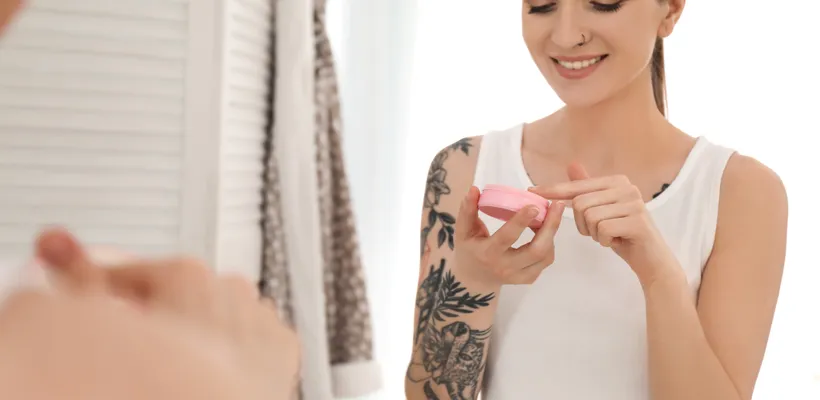
Published: 7th May, 2020 in: Health Advice
With the growing ink trend seemingly having a book over the last decade, it is no surprise that tattoo aftercare is a top priority for tattoo enthusiasts. You may already be aware of how important tattoo care is following your appointment. There are risks of infections associated with new tattoos and, it may come as a surprise, that your tattoo aftercare routine can also be a deciding factor on the longevity, vibrance, and overall healing of your new artwork.
Our tattoo guide breaks down the physical process experienced by your skin and body when you are tattooed to help explain what aftercare methods you need to use to help heal your body again and prevent infections.
Nowadays with the popularity of Instagram, many people find their tattoo artists via social media. This helps them look for the right artist for their desired tattoo style whether it's traditional, neo-traditional or realist. From there a booking can be made usually via email to set a data and time for your next or first piece of ink.
The actual process of tattooing is fairly simple. A tattoo is when a special type of ink (known as tattoo ink) is punctured into the skin using needles attached to a tattoo gun. This injects the ink into a deeper layer of the skin making it more permanent. There are more traditional forms and methods of tattooing that have been used throughout history, but modern day tattooing commonly opts for the tattoo gun route.
There are risks with tattoos which is why it is important to research and check your tattoo artist is correctly licenced and qualified to be tattooing. If sanitised needles and areas are used coupled with good tattooing techniques and aftercare, then the risks of infection can be greatly reduced.
Most tattoo artists will advise their clients about tattoo aftercare because it is so important in making sure you recover well and experience good tattoo healing. There are some don’ts when it comes to a freshly new tattoo which you should try to stick to, these include:
Your tattoo artist should put a thin layer of ointment over your new tattoo and wrap it in a plastic wrap. This is to help prevent infection and keep the tattoo ink protected from distress which could cause ink to fall out. Tattoo ointments and creams are available for you to use to support the tattoo healing process.
Use antibacterial wipes to ensure your skin keeps clear and to protect against infection. Leading brands include Dettol Hand Soap and Savlon Antiseptic Cream.
Find the right tattoo aftercare creams and ointments to keep our skin healthy and support the healing process.
Be gentle when cleaning your tattooed skin and even pat your skin dry to protect the tattoo ink. This will help make sure you’re left with a beautifully healed tattoo.
Wear sun protective clothing and gear when outside to prevent the sun from making your tattoo fade or irritating the skin.
Take showers in favour of baths - This is common advice given by some artists because of the belief that the water can damage the underlayer of the skin.
A tattoo is a fresh skin wound which needs to heal back to normal following the tattooing process. As a result, like with any open wound, anything that comes in contact with the skin could cause an infection.
Infections are caused by viruses, bacteria, fungi and similar. Infections are uncomfortable and can cause serious health problems, therefore needing professional medical treatment to help heal. It is important when you get a new tattoo to prevent infections as much as possible in the first place. Covering the wound (tattoo) will help to limit its contact with surfaces and bacteria, etc which could cause an infection.
Covering the tattoo also helps support the ink from dropping out in baths, exercising, or by touch. This means your tattoo has a better chance of healing vibrantly and looking as good as the original stencil design.
As briefly mentioned earlier, gently washing a tattoo is also an important aftercare tip. Pat dry your tattoo to prevent disrupting the ink and design.
Washing the skin is important for personal hygiene and to help prevent infection, however being gentle with the tattoo will help make the healing process more pleasant as being rough with a sensitive area of the skin is never fun!
Using non fragrant products may also help to prevent irritating the tattooed skin.
Using suncream is important whenever you’re going out in the sun, tattoos or no tattoos.
However, the sun can pose a problem for tattoos as it can cause ink to fade and can be harsh on sensitive skin, such as wounds. Sunburn on new tattoos can cause pain and damage to the design, which is why you should be wearing sun cream protection and cover your new tattoo with appropriate clothing to prevent sun damage to your tattoo and skin.
There are tattoo sun creams available to help those with new tattoos who want to also enjoy the sun.
If you are looking for the best tattoo aftercare products, check out our affordable range of tattoo care products that can be delivered straight to our doorstep!